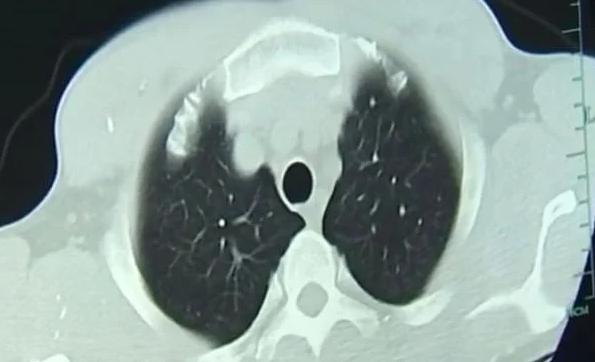Imagine sitting down for a seemingly harmless meal, only to discover weeks later that it led to a horrifying infestation of hundreds of worms in your body. This is precisely what happened to Zhu Zhongfa, a Chinese man whose life took a devastating turn after consuming undercooked pork. The story is not only a chilling reminder of the dangers of improperly cooked food but also an urgent wake-up call about food safety.
The Fateful Meal That Started It All

For Zhu Zhongfa, it all began with a meal that seemed normal at the time. He consumed pork that, unbeknownst to him, was undercooked. That one dish turned into a nightmare, as it carried the eggs of Taenia solium, a parasite commonly known as the pork tapeworm.
What Zhu didn’t know was that these eggs would hatch into larvae inside his body, traveling through his bloodstream and embedding themselves in vital organs like his brain and lungs. Within weeks, Zhu began experiencing alarming symptoms such as seizures, fainting spells, and episodes of foaming at the mouth. His condition grew so severe that he could no longer perform his job as a construction worker, where operating heavy machinery made his seizures life-threatening.
A Delayed Diagnosis with Devastating Consequences
Despite suffering for weeks, Zhu only sought medical attention when his symptoms became unbearable. By the time he arrived at the hospital, he was losing consciousness regularly. Doctors quickly identified the culprit: a widespread tapeworm infestation that had invaded his brain, lungs, and muscles.
Dr. Huang Jianrong, a physician at the Affiliated Hospital of Zhenjiang University School of Medicine, conducted extensive tests, including MRI scans of Zhu’s brain and chest. The results were shocking.
“He not only had numerous lesions in his brain, but he also had cysts in his lungs and chest muscles,” Dr. Huang explained. The infestation had caused severe neurological symptoms, including seizures and fainting, due to space-occupying lesions in his brain. Left untreated, this condition could have led to permanent brain damage or even death.
How Tapeworms Invade the Body
The pork tapeworm, Taenia solium, has a complex life cycle that makes it especially dangerous. Humans can ingest the parasite in its larval or egg form, typically through contaminated food. Here’s how it works:
- Consumption of Contaminated Pork: Eating undercooked or raw pork containing tapeworm larvae introduces the parasite into the digestive system.
- Hatching and Migration: Once ingested, the eggs hatch into larvae, which enter the bloodstream and travel to various parts of the body, including the brain, lungs, and muscles.
- Formation of Cysts: The larvae embed themselves in tissues, forming cysts. These cysts can decay over time, leading to infections and severe inflammation.
In Zhu’s case, the tapeworm larvae not only reached his brain but also caused a condition called neurocysticercosis, a serious and potentially fatal infection characterized by cysts in the nervous system.
The Symptoms of a Tapeworm Infestation

Tapeworm infestations can manifest in various ways, depending on where the larvae migrate and settle. Common symptoms include:
- Neurological Issues: Seizures, headaches, fainting, and even dementia.
- Respiratory Problems: Persistent coughing if the cysts form in the lungs.
- Vision Loss: If larvae migrate to the eyes, blindness can occur.
- Muscle Pain: Cysts in the muscles can cause soreness and inflammation.
In some cases, symptoms may not appear immediately. It can take years for larvae to reach critical organs like the brain, making early detection difficult.
How Doctors Treated Zhu’s Condition
Upon confirming the diagnosis, Zhu’s doctors prescribed anti-parasitic medication to kill the tapeworms. He also required treatment to manage the inflammation caused by the dying parasites. Removing the cysts from his brain and other organs was a delicate process, as the decaying larvae could trigger further infections.
The medical team successfully removed over 700 tapeworms from Zhu’s body, saving his life. However, his ordeal highlights the severe consequences of consuming contaminated food.
The Importance of Properly Cooking Pork

Zhu’s case is an extreme but avoidable example of the dangers of eating undercooked pork. To prevent similar infections, it’s essential to follow these food safety practices:
- Cook Pork Thoroughly: Ensure pork is cooked to an internal temperature of at least 145°F (63°C). Use a meat thermometer to verify.
- Wash Hands and Utensils: Always wash your hands, cutting boards, and utensils after handling raw meat to avoid cross-contamination.
- Purchase Meat from Trusted Sources: Buy pork from reputable suppliers who follow strict hygiene and inspection protocols.
- Avoid Raw or Undercooked Meat: Dishes like rare pork or certain raw delicacies can carry significant risks.
The Global Impact of Tapeworm Infections
While Zhu’s case occurred in China, tapeworm infections are a global issue, particularly in regions with poor sanitation or limited access to clean water. The World Health Organization (WHO) estimates that millions of people are infected with tapeworms annually, with neurocysticercosis being a leading cause of epilepsy in developing countries.
Efforts to reduce the prevalence of tapeworm infections include improving food safety standards, promoting hygiene education, and increasing access to medical care in affected regions.
How to Spot and Prevent a Tapeworm Infection

If you suspect you may have a tapeworm infection, watch for these signs:
- Unexplained weight loss.
- Persistent stomach pain or nausea.
- Neurological symptoms like headaches or seizures.
Seek medical attention immediately if you experience these symptoms, especially after consuming undercooked meat. Early diagnosis and treatment are critical for preventing severe complications.
Conclusion: A Hard Lesson in Food Safety
Zhu Zhongfa’s harrowing experience serves as a stark reminder of the risks posed by undercooked meat. What started as an ordinary meal turned into a life-threatening ordeal, with 700 tapeworms invading his body and causing devastating symptoms. Fortunately, Zhu received timely medical care, but his story underscores the importance of food safety.
To protect yourself and your loved ones, always cook pork thoroughly, practice good hygiene in the kitchen, and remain vigilant about the sources of your food. A few extra precautions can mean the difference between a satisfying meal and a nightmare you won’t soon forget.


